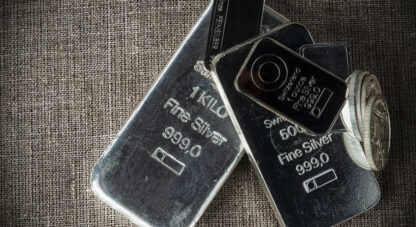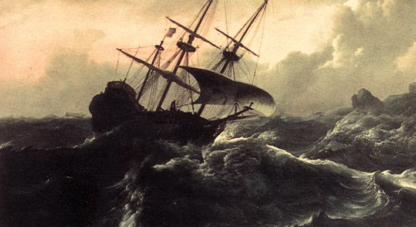This Memorial Day, as we reflect on ordinary Americans who did extraordinary things at ultimate cost, it’s also worth reflecting on their character. Character, after all, is the most important measure of a person.
A person born in poverty can prove him- or herself to be a giant in character. Likewise, a person to the manor born can prove—and often does—a cad. Situation is no determiner of character, but is most certainly a revealer of it and an opportunity to develop it.
This truth is almost certainly at the heart of the answer to the oft-asked question, “Why do bad things happen to good people?” When we lose a loved one to tragedy, do we curse God for the loss or thank Him for the time we had with the person? When treasured plans are thwarted, do we curse God for it or thank Him for showing us that there are more important things than us?
These are extremely hard questions, of course. This author is under no illusions in that regard, having experienced both of these devastating situations and not always having shown the most sterling of character. Still, we all know people who have revealed deep and lasting character in horrible circumstances. Them, we should honor.
Character is exactly what is breaking down in America today. People of ignoble intent tell us that any perceived slight regarding our moral bearing is a cause for tantrum, political change, enshrinement of self-centeredness in law, and the utter destruction of any objectors. The complainants are children who refuse to grow up, indulged by power brokers in government, academia, media, and elsewhere who gain by such prolonged childishness.
In contrast, the persons we honor today answered when their country called. They had lives to live, but they put those lives on hold. They trained hard, then went to war against other just-folks whose leaders were at odds with our leaders—for reasons real or perceived. The horrors endured in the process cannot be imagined by those unexposed to war. And the end of all this, for those we honor today, came through death.
All of this was at the behest of, under the leadership of, and for the benefit of other people. Emphatically not themselves. What a difference.
May we all honor such people today, and dedicate ourselves to emulating them rather than the children in adult bodies who dominate our political scene.
And as always, please take some time to read or listen to the below publications. The authors uphold the time-honored standards of high character, and give time and regard to those who have excelled in the process.
America has produced many men and women of high character. May we honor them, imitate them, and help them in their efforts. And may we especially honor those who have gone to their eternal reward in the process of safeguarding the lives and freedoms of others.
Key Takeaways:
- Bad guys have bad days, too
- What price, riches?
- Monetary freedom is an indicator of other freedoms
- Silver is the story to watch—for now
The McAlvany Weekly Commentary: A New International Order…
David conducts a timely interview of Kamran Bokhari, Senior Director of the Eurasian Security & Prosperity Portfolio at the New Lines Institute and Senior Consultant with the World Bank, who has also worked with the U.S Department of State’s Foreign Services Institute. The two discuss events in the Middle East, particularly with the recent death of Iran’s president and foreign minister. Behind the often one-dimensional reporting on news from the Middle East, defined and refined for an American audience largely unconcerned with the rest of the world, lie a multitude of factors. Dr. Bokhari lays those factors bare, discussing the many challenges Iran faces and how those factors influence its actions on the world stage. He discusses Iran’s extensive program of war-by-proxy, and how that recently backfired. When the Houthis began disrupting shipping through the Red Sea, Israel responded by striking Iran’s own Quds Force operating on the northern flank of Israel. This caused Iran’s proxies (such as Hamas, Hezbollah, and the Houthis) to look at them and say, “‘What are you going to do next?’ So there’s an issue of credibility, not just from your own base at home, but also from your proxies.” This deep dive into the forces and actors operating in such a critical and influential region is something you won’t want to miss.
Credit Bubble Bulletin: Speculative Bubble Hype
The appropriateness of Doug’s bubble framework for analysis of American (and world) monetary policy is driven home by his opening quotation from Bloomberg this week: “Nvidia’s 110% gain this year is enough to slingshot the company’s value above the entire market capitalization of Germany along with a range of other major bourses. The AI-boom poster child overtook Australia in early February, topped South Korea a few weeks later and as of the Thursday close, is now also above Germany. The next 20% leg higher would likely add Saudi Arabia and Canada to the list. And if the prediction from one of Bloomberg TV’s guests on Thursday is correct and Nvidia does top $10 trillion, that would make it larger than all the world’s stock markets except the US.” Doug goes on to show that the bubble encompasses far more than one admittedly huge company. How should rational people react to such information? Forget pennies, investing in stock darlings is like picking up hundred-dollar bills in front of the world’s biggest steam roller coming down Filbert Street in San Francisco. Will the brakes hold? Will greed take investors too close to the roller? Will an overdue earthquake destroy it all? This is what risk indifference in the face of unimagined riches looks like. No one describes it better than Doug. (Most investors can’t even see it.)
Hard Asset Insights: Loyalty to Country
Morgan takes a well-deserved break after a few highly eventful weeks, using this week’s missive to offer some hard-hitting quotations apropos to Memorial Day. Included in the mix is this trenchant observation from mental heavyweight Ludwig von Mises, “The freedom that the market economy grants to the individual is not merely ‘economic’ as distinguished from some other kind of freedom. It implies the freedom to determine also all those issues that are considered as moral, spiritual, and intellectual.” Perhaps economic freedom is not the most important thing in life, but it heavily influences our ability to pursue and enjoy the most important things. This week’s installment of HAI is a paean to those Americans who, whether grasping the nuances of such weighty facts or not, gave the last great measure of devotion to preserve the American way of life. May our gratitude for such sacrifice be true and unending, and may we be ready to match these souls’ courage now and always.
Golden Rule Radio: Now is the Time to Buy
Miles kicks off the program with charts showing movement in the precious metals and the S&P 500 since the previous episode of GRR. The metals had a momentous week, moving sharply up and then just as sharply down. Most ended near where they started in elevation, belying the route they took over the mountain and down the other side. The S&P, in contrast, traded nearly flat for the week. Rob and Tory observed that investors who have previously been reluctant to join the precious metals trade are now moving off the sidelines and buying. Tory points out that the moves in the metals were not apparently driven by world events, rather by financial considerations. The hosts also emphasize that we need to get used to new all-time highs in the metals, in commodities, and other things because that’s what our current monetary policy does. It’s inflationary, so things will go up in price. In that light, however, the hosts point out that silver, though it had a fantastic week, is still $18 from its all-time high. “All eyes should be on silver,” notes Rob. “Buying silver today is just buying gold for 1600 bucks,” says Miles, recounting David’s point from recent Commentary episodes.















